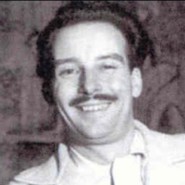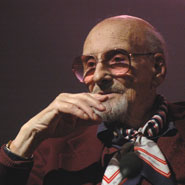The Thunder ChildScience Fiction and Fantasy |
| |
|
| |
|
|
Guest Appearances: A Tribute to Val Guest by Ryan Brennan
Guest also has to his credit two Stanley Baker films, Yesterday's Enemy (1959) and Hell is a City (1960). Baker was an up and coming British star who would become something of an international name, particularly after the release of his revered film Zulu (1965). Yesterday's Enemy was a WWII film set in Burma and garnered a British Academy Award nomination. Hell is a City was a tough, nourish crime picture. Guest also gave Peter Sellers his first big film role in Up the Creek (1958). During the spy craze of the 1960s Guest made his own contributions with Where the Spies Are (1965) with David Niven and Francoise Dorleac (Catherine Deneuve's sister) and Assignment K (1968) with Stephen Boyd and Camilla Sparv. Throughout his career Guest worked with many other good actors like Michael Rennie, Margaret Lockwood, Frankie Howerd, Roddy McDowall, Jon Pertwee, Laurence Naismith, Petula Clark and Andre Morell. In the mid-1950s he brought to the screen Life with the Lyons (1954) and The Lyons in Paris (1955), cinematic adaptations of a popular radio show that starred silent film star Bebe Daniels (The Maltese Falcon; 1931) and her film star husband Ben Lyons (Howard Hughes' 1930 Hell's Angels). Guest also directed the highly memorable Expresso Bongo (1960) in which Laurence Harvey gives what is probably the most animated performance of his career as a manic music promoter. Oddly, Guest's best films tended to be the ones written by other authors. And despite several top-flight films, his best work was in the science fiction genre. His first brush with the world of science fiction was the feature film Mr. Drake's Duck (1951). The story centered on a duck that laid a radioactive uranium egg. Douglas Fairbanks, Jr. was the lucky owner. Although the film may have laid an egg (yes, a fowl pun if ever there was one), Guest came up a winner. It was on this film that he met his wife, actress Yolande Donlan, who, under the name Yolande Mallott, appeared in the Lionel Atwill, Fay Wray Poverty Row horror film The Vampire Bat (1933). Guest really made his mark at Hammer. Hammer would become known for its lush color remakes of the classic horror films that had featured Dracula, the Frankenstein Monster, Dr. Frankenstein, the Mummy and the Wolfman. But first, the studio produced a series of modestly budgeted black & white science fiction films, one of which was The Quatermass Xperiment (U.S. title: The Creeping Unknown)(1955). Nigel Kneale wrote the original TV serial that made such an impression on British viewers under the title The Quatermass Experiment. The "X" in the movie title was a clever advertising gimmick. In Britain, an "X" certificate promised a film of more adult content. Given the generally genteel nature of British films, this story of a pitiful astronaut, the only survivor of Professor Quatermass' first manned rocket flight, who is taken over by an alien life form and transformed into a hideous mutant, may have struck some viewers as extremely horrific. Richard Wordsworth's compassionate performance as the ill-fated astronaut kept the human element in the horror but also emphasized the terribly sad nature of the situation. Guest overcame various obstacles - American character actor Brian Donlevy is a rather loud and brash Quatermass and the film was low budget - to produce an intelligent and, at times, exciting science fiction thriller. The novelty of the alien life form, something resembling an ugly garden plant of tremendous size, had not been seen before. The success of this first Quatermass film and a subsequent popular TV serial, Quatermass 2, led to a sequel film of the same name, but retitled for the United States as Enemy from Space (1957). In this film Professor Quatermass is surprised and alarmed to discover a synthetic food factory that he believes is an alien base of operation for an invasion of Earth. Donlevy was back again as the Professor and Guest again wrings considerable suspense and tension out of the low budget effort. The climax, in which giant, vegetative creatures emerge from the factory is particularly fun. Arguably, the high point of his time at Hammer could be The Abominable Snowman of the Himalayas (1957). Once again, Guest was working from a story by Nigel Kneale, in this case a story and TV serial named The Creature (starring Stanley Baker). Explorers run across evidence of the fabled Yeti, then find themselves disappearing one by one from their remote, snowed in mountain camp. The tension mounts until only two members are left. The film is measured in pace but provides a consistently interesting and involving story. It is suspenseful rather than frightening and provides a better-than-usual metaphysical discourse than most films of this type that attempt profundity. And its portrayal of the Yeti is one of the most unusual and intelligent in that small sub-genre of film, concluding with an unsettling, almost spiritual revelation. Forrest Tucker (The Trollenberg Terror, aka, The Crawling Eye; 1958), who Guest directed in an interesting little film for Hammer, Break in the Circle (1955), played a gruff American riding roughshod over Peter Cushing's refined botanist. It can also be argued that Guest's best film in the genre was The Day the Earth Caught Fire (1961). This end-of-the-world film depicts the events that occur when the Earth is knocked off its axis by nuclear explosions. The disruption sends the Earth on a trajectory towards the Sun. As the planet becomes hotter and hotter, the story continues to be reported by two London reporters played by Edward Judd and Janet Munro. Their lack of hysterics, their poise and grace in the face of certain death, makes their plight all the more touching without descending into sentimentality. The black & white cinematography and the unsensational treatment of the subject, along with the use of authentic locations lends the film an air of realism. The versimilitude of the film even extends to using the real-life editor of the Daily Express, Arthur Christiansen. The film very convincingly creates a palpable sense of the smothering heat that envelops the cast. Guest's contributions to the mammoth James Bond comedy Casino Royale (1967) are a bit harder to ascertain. Bond films, with their gadgets and the fantastic plots of their villains, occupy a borderline area of science fiction. At least this Bond film includes a flying saucer. At any rate, Guest is usually given credit for keeping this shambling mess together. Guest had already crossed paths with Bond, in a manner of speaking, at various times in his career writing or directing films featuring some of the Bond retinue of actors: Bernard Lee ("M"), Desmond Llewellyn ("Q"), Shirley Eaton (Goldfinger's Golden Girl), and Robert Brown (Admiral Hargreaves, "M"). Casino Royale was originally intended to star Peter Sellers as Bond, the comic actor completed some of his scenes and then walked off the film. Producer Charles K. Feldman, having already sunk a considerable sum of money in the project, had Sellers' role rewritten to feature numerous Bonds. He called in nearly as many writers and directors to bring the runaway production to a conclusion. Guest reportedly got the lion's share of screen footage and directed additional film to create bridges and segues between the other directors' work (four others including John Huston). The resulting film is hit and miss. Tomorrow (1970) was a science fiction musical, a tiny sub-genre occupied by few films other than this, the unreleased punk sci-fi musical Pop. 1 and the more conventional Broadway-style The Last Starfighter. Aliens kidnap the pop band Toomorrow because the audio vibrations of their music can somehow save their race from dying out. Rock impresario Don Kirshner and Bond co-producer Harry Saltzman produced. Olivia Newton-John starred. Guest handled a difficult assignment when he directed When Dinosaurs Ruled the Earth. One Million B.C. (1940) pioneered the caveman picture in the sound era and One Million Years B.C with Raquel Welch brought the idea back with a vengeance. The difficulty of such pictures is that the cast generally speaks gobbledy-gook, wears few clothes and can quite easily be made ridiculous. Additionally, the audience is usually there to see aforementioned scantily clad female cast members and some dinosaurs. The movie really delivered in both areas, providing several lovely females, led by Playmate of the Year Victoria Vetri, and featuring the Academy Award nominated stop-motion special effects of Jim Danforth.
Guest's legacy - both as man and producer/director/writer - will not be forgotten. Return to:
|
|







